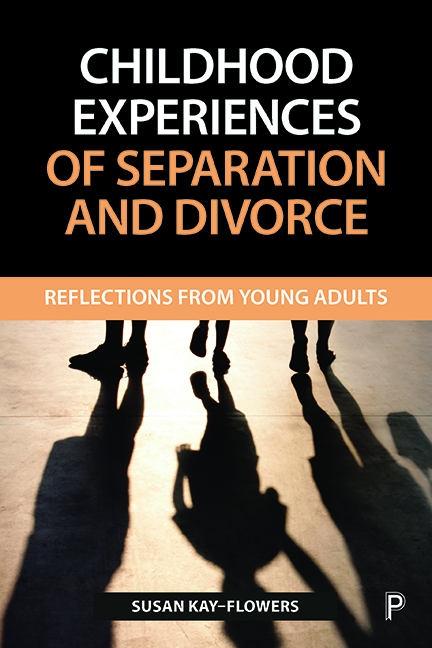Book contents
- Frontmatter
- Dedication
- Contents
- Figures and tables
- Acknowledgements
- One Introduction
- Two What is known about children’s experience of parental separation and divorce?
- Three The research study
- Four Constructing a new framework for understanding children’s accommodation of parental separation
- Five Setting the context for the framework: emotions
- Six Reactions
- Seven Support
- Eight Communication
- Nine Conflict
- Ten Future directions
- References
- Appendices
- Index
Three - The research study
Published online by Cambridge University Press: 27 April 2022
- Frontmatter
- Dedication
- Contents
- Figures and tables
- Acknowledgements
- One Introduction
- Two What is known about children’s experience of parental separation and divorce?
- Three The research study
- Four Constructing a new framework for understanding children’s accommodation of parental separation
- Five Setting the context for the framework: emotions
- Six Reactions
- Seven Support
- Eight Communication
- Nine Conflict
- Ten Future directions
- References
- Appendices
- Index
Summary
This chapter describes the research study in four parts. The first part outlines the aims of the study and explains how young people were involved in the research design and co-creation of specific research tools to undertake the study, a process involving the creation of a bricolage. The research tools involved developing a video clip of a fictionalised case study known as a ‘prompt simulation video’ (PSV) and creating an online questionnaire. The PSV, uploaded alongside the questionnaire, acted as a prompt for respondents’ reflections on their childhood experience of parental separation. The research tools are described in the first part of the chapter where consideration is given to the benefits as well as the challenges of working in this way.
The second part of the chapter describes the study sample and population characteristics. It provides information about the respondents who took part in the study, including their current age as well as their age at the time of separation, providing a guide to the amount of time that had passed since their parents separated.
The data analysis process is described in the third part of the chapter. The data was analysed according to young adults’ views of their childhood experience of parental separation with a focus on their ‘accommodation’ of post-separation changes over time. Responses to a question which asked respondents how they felt about the changes now were categorised and positioned on Continuum 1 according to the level of ‘satisfaction’ (high, medium or low) they showed and on Continuum 2 according to the level of ‘acceptance’ (high, medium or low) expressed. Where the levels aligned across the continua, they were combined to indicate a respondent's level of ‘accommodation’ of parental separation and post-separation changes. This became the central category for analysis enabling aspects of their experience and factors influencing their level of accommodation to be identified, these were then used to create a new framework for understanding children’s accommodation of parental separation and post-separation changes as described in Chapter Four.
The fourth part of the chapter reflects on the research methodology, outlining its strengths and weaknesses as well as the limitations of the study.
- Type
- Chapter
- Information
- Childhood Experiences of Separation and DivorceReflections from Young Adults, pp. 41 - 66Publisher: Bristol University PressPrint publication year: 2019



